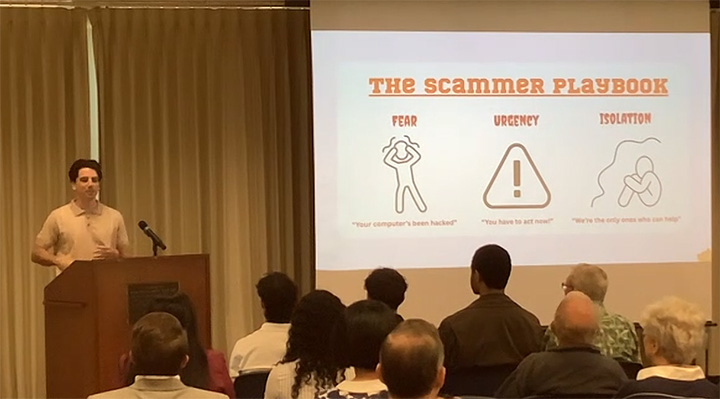Scams are everywhere. SDSU is fighting back.
The Scam Institute will train students and work with local partners to protect Americans from threats that often target seniors.

Last year alone, Americans lost $158 billion to scams — a sum now rivaling the entire illegal drug trade. To fight back against this growing crisis, San Diego State University is launching the SDSU Scam Institute, a first-of-its-kind initiative to help protect vulnerable households, train a new generation of fraud fighters and partner with industry and government to shut down the $158 billion scam economy.
The institute, called the SDSU Consortium Against Manipulative Schemes, still in its pilot phase, emerged from a campus-wide collaboration involving cybersecurity, behavioral science, public health and criminal justice experts—all committed to turning SDSU’s research strength into national impact.
The idea gained momentum inside SDSU when more than a dozen campus leaders convened over the summer to identify ways to create collaborations among our programs in cybersecurity, homeland security, public health, education behavioral science, data analytics, communications and criminal justice, and further leverage SDSU’s R1 research status and long-term reputation as a leader in cross-border collaboration.
“In San Diego, we have the talent and partnerships to turn the tide,” said Alex Altomare, senior director of development for SDSU’s Mission Valley Innovation District. “This is about American security and prosperity.”
Ricardo Fitipaldi, who has served as SDSU’s chief information security officer for seven years, invited two colleagues to participate: Lance Larson, principal investigator for SDSU’s Cyber Clinic, and professor Robert Harkins of SDSU’s Homeland Security program.
“Cyber-based threats are not going away,” said Larson, author of The Little Black Book of Scams. “Artificial intelligence, machine learning and neural networks help scammers and cyber threat actors carry-out their scams faster and more efficiently, all while making social engineering attempts, phishing emails and text messages almost indistinguishable from the real thing.”
SDSU is designing the Scam Institute in active collaboration with national leaders. Former FBI agent Brady Finta founded the National Elder Fraud Coordination Center (NEFCC), which is backed by AARP, Walmart, Amazon and Google, to create a coordinated, offensive strategy against scams targeting the elderly.
“I believe this is the crime of our time, and while it disproportionately impacts older Americans, it is a societal problem requiring a whole of society to answer,” Finta said. “NEFCC is excited to join with SDSU as we bring private industry, law enforcement, non-profits and academia together in the fight against elder fraud.”
SDSU launched an inaugural collaboration with NEFCC this semester. A cohort of seven students from the San Diego Cyber Clinic at SDSU worked with NEFCC and AARP to develop a new approach to public scam education and awareness. On Oct. 24, they delivered their findings to the Coronado Roundtable, a monthly civic engagement group in Coronado that meets to discuss current events and other popular subjects and is open to all members of the public.
One of the most impactful moments for SDSU students during the event came after the presentation, when a near-retirement aged San Diegan spoke of a dear friend who was a victim of a scam that wiped-out all of their retirement accounts. The student group commented that they never imagined scams could completely change a victim's life, even in retirement.
Through the partnership with NEFCC, Altomare also engaged with members of the Aspen Institute’s National Scam Task Force to align campus capabilities with a national response framework that was delivered to members of Congress on Oct. 1. Subsequently, on Oct. 9, SDSU hosted a summit with the Healthy Aging Coalition, a nationwide group influencing policies for older adults led by SDSU alumna Vicki Shepard, where Altomare briefed coalition members and local partners on the current state of the scam economy and how SDSU will lead within the Aspen Institute’s national framework.
“SDSU’s Mission Valley Innovation District is being designed for exactly this kind of cross-sector work,” says Altomare. “By aligning the breadth and depth of the university’s intellectual capacity around solving one of our greatest societal needs, SDSU is delivering impact and creating new opportunities for our students while keeping people safe nationwide.”
Philanthropic partners will make this mission possible. Investment is vital to accelerate student-led interventions, expand our research capacity, with the goal of transforming the early-stage Scam Institute programming into a purpose-driven hub in the Innovation District.
For more information on partnering with the institute, supporting our students and labs, preventing scam victimization, or building the hub, contact Alex Altomare by email at [email protected]



